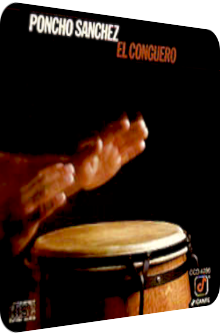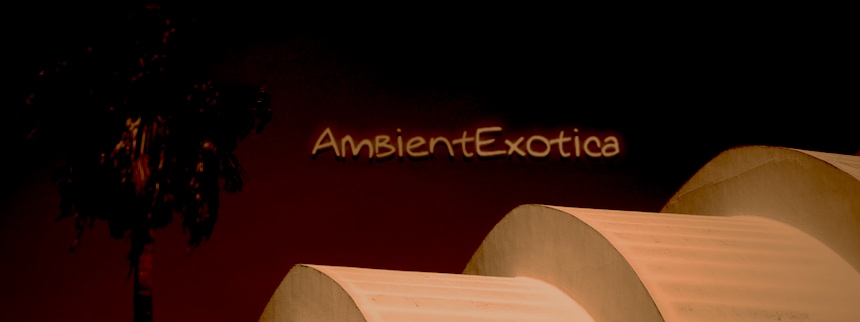
Poncho Sanchez
El Conguero
1985
El Conguero is a Latin record by Poncho Sanchez (born 1951) and released in 1985 on the artist’s house label Concord. Featuring nine tracks, eight musicians, four unique cuts and cavalcades of drums and horns, El Conguero is titled after the bandleader whose skills on the congas and so-called batá drums is one important driving factor of this album. The other is a bit harder to explain, as it is based on an amalgamation of reasons.
In short: Exotica fans will likely approve of this record. The arrangements are extrapolated by melodies that are easy to grasp, compatible with one’s wish to sing along to them – which the band also does on two pieces – and mercilessly good-natured. With the quasi-exception of one cautiously shadier tune that inherits scents of Latin devotion and yearning, everything is felicitously aglow. And this is what Exotica fans might adore the most, as the vintage factor is huge. This album could have been created in the 60’s the way it is presented. No funky guitar, no keyboard, not even a synthetic drum is ever injected. The arrangements are delightfully retro. The table of contents consists of less considered Latin side notes and compositions from the classic book of jazz standards. The personnel, meanwhile comprises of an octet, featuring conguero, batá drummer, bandleader and student of Cal Tjader, the mighty Poncho Sanchez, timbalist Ramon Banda, bongo player David Romero, pianist and songwriter Charlie Otwell, saxophonist Dick Mitchell, trombonist Art Velasco and trumpeter as well as flügelhorn player Sal Cracchiolo. Whatever the original material once was, it is transmuted into something sun-kissed, percussion-driven and incessantly friendly.
Siempre Me Va Bien launches the album as if it was running all along. This strategy of an immediate opening phase is generally called in medias res, and all the better if it is so delicately constructed as on Sanchez’s rendition of David Torres’ classic. The gleefully imposed Latinisms on this corker are silkened, more awash with light than hazily dusky. After a polyphonous alluvial plain made of brass, Charlie Otwell’s archetypical but well-working piano driblets bubble through the sound waves of Dick Mitchell’s lead tenor saxophone. Ramon Banda augments the moisture with his bright timbales, whereas Poncho Sanchez himself remains mostly in the background on purpose, only coming to the forefront in the second half, then living up to the album title’s connotative setting. This opener showcases the interplay and interaction, not the focus on a particular instrument, maybe with the exception of Mitchell’s said tenor sax and Sal Cracchiolo trumpet in the second phase.
The following tune Mi Negra is written by Sanchez himself. This Bossa Nova features a red color scheme through its existence in the realms of sound. A prominent guiro-and-conga coppice serves as the primary percussion placenta, with frizzling cymbals, large-grained maracas and iridescent timbales functioning as brightly lit counterparts to the amicable murkiness of this piece. Less multilayered melodies do not prevent Mi Negra from being catchy: Otwell’s piano and the short-lived horn segues work to its advantage, as do the band’s vocals. Sanchez’s solo on a pair of batá drums rounds off the midtempo synergy.
Frank Foster’s Shiny Stockings is a curious choice from the outset, but not if the title is taken as seriously as on this album. Particularly faux-drenched and galloping drums mimic said stockings and the shoes that come with them. In addition, the octet decides to rev up the luminosity of the cymbals which now seems almost cosmic. Cracchiolo’s spiraling trumpet tones as well as the simultaneous insouciant mellowness of the piano backdrop make Shiny Stockings a piece that is delightfully gentle and less about a profligate, saucy interpretation. Pianist Charlie Otwell’s own Si No Hay Amor, however, is where the album becomes stellar to me, while at the same time annoying many a listener, I suppose. The reason is a magical mirage, a laid-back piece of nocturnal togetherness. David Romero’s bongos accentuate the procession softly, Dick Mitchell’s tenor saxophone emanates moon beams, the hollowness in the background oozes through the enchanted atmosphere. Admittedly, the unleashed wind chimes may be a superfluous vestige of chintziness to some, but I for one like their momentary glitziness.
This enthralling piece is soon replaced by Yumbabé, an upbeat song of rotatory pointillism. The timbales, cowbells and piano spirals form the base frame and offer the necessary amounts of sunlight for the ten-note brass euphony to shine even more. A Samba at its core, the members laugh and shout cheerfully in this tropical high-voltage reverie, making it a great counterpart to the preceding Si No Hay Amor and a great interim closer whose drum-driven gestalt reminds the listener of the very principles which really drive the album.
Side B features an additional four cuts which launch with Charlie Otwell’s second submission to the table of contents. Called Agua Dulce, it lives up to the camouflaged and opaque sub-theme of the album, namely the liquedous physiognomy. Not a fluxion or river per se, the pianist’s piece is keen on bongo driblets and batá blebs percussion-wise, but otherwise remains in luminous climes thanks to the harmonious blending of the brass layers and the warmhearted glow of the piano chords. Said brass layers are surprisingly eclectic, offering a great task for devoted Cool Jazz fans to decipher without alienating the Latin fans or that specific clientele that views this album from an Exotica angle. Said viewpoint is not only applicable, but constantly nurtured throughout the album, and Steve Huffsteter’s Night Walk is no different. Featuring a guiro-backed Bossa Nova groove, lacunar batá-and-conga intertwinements, the piece really feels like an unmindful walk in well-known surroundings at night, with not a care in the world.
Tin Tin Deo by Gil Fuller, Dizzy Gillespie and Chano Pozo then makes many things different all of a sudden and could well be the standout piece of the album, at least due to its permanent rhythm shifts with a more than stupefying stringency despite the occasional – and intended – wonkiness at the respective suture. The percussion instruments are the real kings here, hissing, twinkling and foaming in an excitingly polyhedric piece whose melodies cannot live up to the multifaceted skeleton. The album’s finale is based on Marty Sheller’s Cuidado, a brute of over seven minutes that presents a drum galore in the veins of Tito Puente’s Top Percussion (1957), but later merges into a catchy piece of piano corkscrews, brass flourishes and showtune allusions, all the while the octet never neglects feature #1 of this long-form serenade: the drums. And in the center: el conguero.
Poncho Sanchez is well-beloved in the community of fans who want that Latin spirit in their music much more carved out and superimposed than the flamboyancy of Exotica or slickness of Funk, even though the tendency shifts more towards Exotica – of all things – in Sanchez's later works. Anyway, if this basic description fits the pattern and strikes you as valuable, then El Conguero is a splendid work. Exotica fans who want birdcalls and string fests will invevitably be disappointed… or so it seems! While no one in his right mind places Poncho Sanchez in the Exotica epicenter, El Conguero comes terrifically close. The album’s disadvantage then turns out to be a huge boon: its comparably retrogressive charm.
Sanchez’s LP is embedded in the tradition of Bobby Montez, Cal Tjader's style of the late 50’s/early 60’s and can even be considered a distant neighbor of Bob Romeo aka Bianchi And The Jungle-Sextet. Melody-wise, El Conguero features exactly those adjuvants the doctor ordered. The tone sequences are eminently sunny and open to scrutiny, and once a convoluted passage occurs, it is accompanied by marvelous drum patterns. It is those drum patterns that make diamonds out of dobs. Never too much in the spotlight while at the same time being influential undercurrents at worst and protruding pikes at best, the drummers and their conguero can cope with any tempo and rhythm. In a curious twist, the song which is less dependent on the drums is incidentally the most valuable one to my ears, and I am fully aware of this contradiction. Pianist Charlie Otwell’s Si No Hay Amor is a nightly soothorama, a haze transformed into a song. It is not particularly hard to play and neglects the talent of everyone involved, but the dreaminess is remarkable… and hence showcases the prestidigitation and skills nonetheless. El Conguero is available on vinyl, remastered CD and a digital download version.
Exotica Review 463: Poncho Sanchez – El Conguero (1985). Originally published on Feb. 5, 2016 at AmbientExotica.com.
